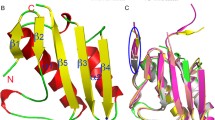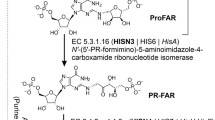Abstract.
Pyridoxal kinase (PK; EC 2.7.1.35), a key enzyme in vitamin B6 metabolism, was cloned from Arabidopsis thaliana (L.) Heynh. and characterized. The amino acid sequence of the A. thaliana PK was found to be similar to the mammalian enzyme, with a homology of more than 40%. Characterization studies showed that the kinase is a dimeric molecule consisting of two identical subunits, each subunit having a molecular mass of approximately 35 kDa. The enzyme exhibited maximal activity at pH 6.0. Similar to the mammalian enzyme, the enzyme from A. thaliana preferred Zn2+ instead of the commonly used Mg2+ as the divalent cation for catalysis. Under optimal conditions, the V max of the enzyme was 604 nmol pyridoxal 5′-phosphate (PLP) mg–1 min–1, and the K m values for pyridoxal and ATP were 688 µM and 98 µM, respectively. Examination of levels of enzyme expression showed that leaves, stems, roots and flowers can generate PLP independently at similar levels. Furthermore, expression of the PK gene in A. thaliana seeds was found to start 60 h after imbibition. Results from the present study suggest that plant tissues depend on PK for the production of PLP.
Similar content being viewed by others
Explore related subjects
Discover the latest articles and news from researchers in related subjects, suggested using machine learning.Author information
Authors and Affiliations
Additional information
Electronic Publication
Rights and permissions
About this article
Cite this article
Lum, HK., Kwok, F. & Lo, S.C. Cloning and characterization of Arabidopsis thaliana pyridoxal kinase. Planta 215, 870–879 (2002). https://doi.org/10.1007/s00425-002-0799-0
Received:
Accepted:
Issue Date:
DOI: https://doi.org/10.1007/s00425-002-0799-0




